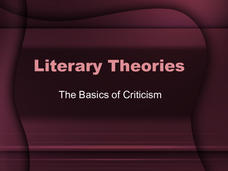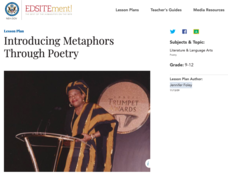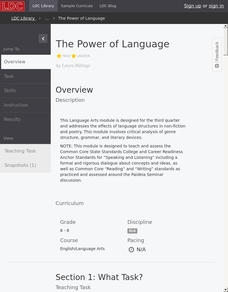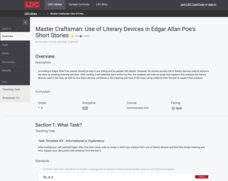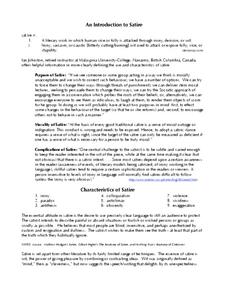National Endowment for the Humanities
García Márquez’s Nobel Prize Speech: “The Solitude of Latin America”
To conclude a study of One Hundred Years of Solitude, class members analyze Gabriel Garcia Marquez's Nobel Prize in Literature acceptance speech. After a whole-class discussion of the main ideas in the speech, individuals draft a...
National Endowment for the Humanities
Magical Elements in Magical Realism
How does Gabriel Garcia Marquez make the magical elements of his novel appear so real? That's the challenge facing readers of One Hundred Years of Solitude. Scholars examine the tone and descriptive details Garcia Marquez uses to make...
Academy of American Poets
Voice
Four lessons make up a poetry unit that introduces high schoolers to spoken and written poetry. Class members also examine poems as social commentary and connect these poems to various novels and plays. A great way to incorporate poetry...
National Endowment for the Humanities
Language Analysis Based on Stave 1
Class members meet the original scrooge, the Dickens character whose name has become synonymous with a cold-hearted, tight-fisted, miser. Using the provided worksheet, readers closely examine context clues to determine the meanings of...
Roald Dahl
George's Marvelous Medicine
Six lessons comprise a unit about Roald Dahl's George's Marvelous Medicine. Over time, scholars explore themes such as the power of words, exciting writing, and mixed feelings. They examine the writing's literary devices, persuasive...
Livaudais-Baker English Classroom
Literary Theories
Introduce ELA scholars to the basics of literary criticism with a 41-slide presentation that identifies eight different approaches to critical analysis. Each approach is defined, and advantages and disadvantages are listed. Also included...
Teach With Movies
The Great Gatsby
Are you thinking about incorporating a film version of F. Scott Fitzgerald's classic novel in a study of The Great Gatsby? Check out a guide loaded with suggestions for how to supplement a reading of the novel with scenes from three film...
PBS
Discuss 22-year-old Amanda Gorman’s inaugural poem “The Hill We Climb”
Two poems by National Youth Poet Laureate Amanda Gorman are spotlighted in a PBS lesson. Young scholars conduct a close reading and watch videos of Gorman reading her inaugural poem "The Hill We Climb" and "The Miracle of Morning." They...
National Endowment for the Humanities
Introducing Metaphors Through Poetry
Metaphors are word pictures, creating images in our brains that draw readers to consider how two seemingly unrelated items are alike. Poems by Langston Hughes, Margaret Atwood, and Naomi Shihad Nye provide learners with an opportunity to...
Weber County Library
Abstract Ideas Explored: Writing with Extended Metaphor
A 25-page packet includes eight detailed lesson plans centered around poems by Emily Dickinson. Each lesson begins with a burning question that high schoolers attempt to answer by using evidence from Dickinson's poems.
Literacy Design Collaborative
The Power of Language
There is power in words. Readers take a close look at three text to determine how language structures affect meaning, including include poems and recipes. Scholars analyze the language authors use by circling important words, underlining...
Literacy Design Collaborative
Master Craftsman: Use of Literary Devices in Edgar Allan Poe's Short Stories
Make the writing process a breeze for literary lovers. Scholars identify literary elements in Poe's The Tell-Tale Heart. They then choose their own short story from Edgar Allan Poe and repeat the processes independently. The final...
Colorado Springs School District
AP Literature and Composition Reading and Writing Transition Tasks
Worried about the summer slide? Scholars keep literature skills sharp by working through a summer packet to prep for AP Literature classes. Pupils annotate and close read short stories, answer questions about a variety of literary...
Free Library of Philadelphia
Resources for Ghost Boys
Jewell Parker Rhodes, the author of Ghost Boys, wanted to bring the historical legacy of Emmett Till and the current topic of racial prejudice into today's young readers' mindsets. Use a reading guide and set of discussion questions to...
PBS
Using Video to Create Setting and Mood
Writers have long used words, the sound of words, and the images created by their words to describe the setting and establish the mood of their stories. To gain a more in depth understanding of how settings can be used to develop a...
Lafayette Parrish School System
Teaching Tone and Mood
Tone and Mood are not synonymous! Introduce young readers to these literary devices with a series of exercises that not only point out the significant differences between the terms but also shows them how to identify both the tone and...
Pittford Schools
Literary Devices, Techniques, and Elements
What's the difference between a speaker and an author? What's an example of anthropomorphism? Clarify the meanings of literary devices, elements, and techniques with a comprehensive glossary of terms.
Deer Valley Unified School District
Close Reading: Analyzing Mood and Tone
The AP Literature and Composition exam is all about close reading. Test takers are presented with a passage and asked to analyze how an author uses literary devices to create a desired effect. Prepare your students for the exam with a...
Ohio Department of Education
A Glossary of Literary Terms
If you're tired of defining allusion, onomatopoeia, and satire for your language arts students, hand out a complete list of literary devices to keep the terms straight. Each term includes a definition that is easy to understand and...
District 186 Springfield Public Schools
Tone, Mood, Theme, and Motif
It's all well and good when you're asked to identify a speaker's tone using his or her body language, facial expression, and pitch and emphasis. Identifying the tone of a written passage is another challenge entirely. Check out an...
Aurora City School District
Do Not Try to Kid a Kidder: The Art of Persuasion
The power to convince others of your argument lies in your knowledge of rhetoric! A thorough packet covers the basics of persuasion, including logical appeals and fallacies, and applies strategies to letters to the editor,...
Prestwick House
Discovering Genre: Poetry
Work on literal and figurative meanings with a lesson focused on Robert Frost's "After Apple-Picking" and "The Road Not Taken." Readers identify the literary devices used by the poet to set the poems' themes, settings, and narrative...
Brooklyn College
Irony, Sarcasm, Satire
Irony, the discrepancy between what is expected and what occurs, is the focus of a reference sheet that provides young writers with models of this literary device.
Jackson School District
An Introduction to Satire
What is satire, and what are its characteristics? A handy handout provides young satirists with all the information they need to analyze a satire or to craft their own.







